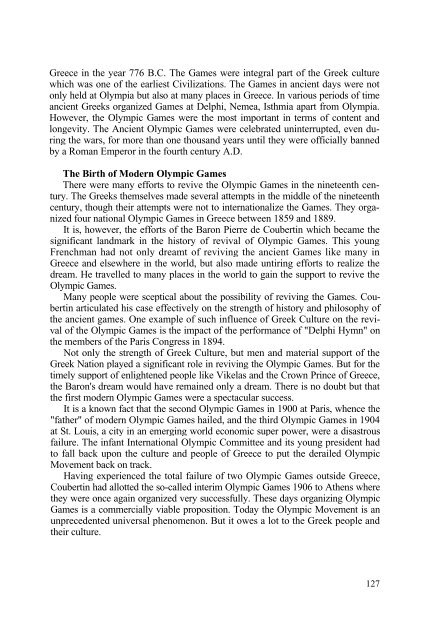Create successful ePaper yourself
Turn your PDF publications into a flip-book with our unique Google optimized e-Paper software.
Greece in the year 776 B.C. The Games were integral part of the Greek culture<br />
which was one of the earliest Civilizations. The Games in ancient days were not<br />
only held at Olympia but also at many places in Greece. In various periods of time<br />
ancient Greeks organized Games at Delphi, Nemea, Isthmia apart from Olympia.<br />
However, the Olympic Games were the most important in terms of content and<br />
longevity. The Ancient Olympic Games were celebrated uninterrupted, even during<br />
the wars, for more than one thousand years until they were officially banned<br />
by a Roman Emperor in the fourth century A.D.<br />
The Birth of Modern Olympic Games<br />
There were many efforts to revive the Olympic Games in the nineteenth century.<br />
The Greeks themselves made several attempts in the middle of the nineteenth<br />
century, though their attempts were not to internationalize the Games. They organized<br />
four national Olympic Games in Greece between 1859 and 1889.<br />
It is, however, the efforts of the Baron Pierre de Coubertin which became the<br />
significant landmark in the history of revival of Olympic Games. This young<br />
Frenchman had not only dreamt of reviving the ancient Games like many in<br />
Greece and elsewhere in the world, but also made untiring efforts to realize the<br />
dream. He travelled to many places in the world to gain the support to revive the<br />
Olympic Games.<br />
Many people were sceptical about the possibility of reviving the Games. Coubertin<br />
articulated his case effectively on the strength of history and philosophy of<br />
the ancient games. One example of such influence of Greek Culture on the revival<br />
of the Olympic Games is the impact of the performance of "Delphi Hymn" on<br />
the members of the Paris Congress in 1894.<br />
Not only the strength of Greek Culture, but men and material support of the<br />
Greek Nation played a significant role in reviving the Olympic Games. But for the<br />
timely support of enlightened people like Vikelas and the Crown Prince of Greece,<br />
the Baron's dream would have remained only a dream. There is no doubt but that<br />
the first modern Olympic Games were a spectacular success.<br />
It is a known fact that the second Olympic Games in 1900 at Paris, whence the<br />
"father" of modern Olympic Games hailed, and the third Olympic Games in 1904<br />
at St. Louis, a city in an emerging world economic super power, were a disastrous<br />
failure. The infant International Olympic Committee and its young president had<br />
to fall back upon the culture and people of Greece to put the derailed Olympic<br />
Movement back on track.<br />
Having experienced the total failure of two Olympic Games outside Greece,<br />
Coubertin had allotted the so-called interim Olympic Games 1906 to Athens where<br />
they were once again organized very successfully. These days organizing Olympic<br />
Games is a commercially viable proposition. Today the Olympic Movement is an<br />
unprecedented universal phenomenon. But it owes a lot to the Greek people and<br />
their culture.<br />
127

















